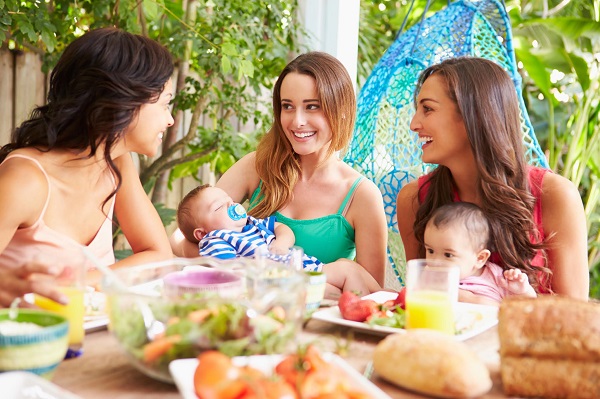Mums and occupational therapists Lynsey Sharp and Kathryn Horgan have developed a programme, Nurturing Newbies, to help parents develop their baby’s senses. Here they outline some simple ways you can help your baby’s senses develop.
Nurturing Newbies
As occupational therapists with over 15 years’ experience working with children, Lynsey Sharp and Kathryn Horgan commonly received referrals for children who experience difficulties with movement and sensory processing, which is impacting on their daily life. This led them to develop Nurturing Newbies, a course to educate parents and take a proactive preventative approach, rather than a reactive approach once problems have emerged.
Sensory Development – in utero
“Our sensory system begins to develop in utero and it is the foundation for all other learning,” says Lynsey. “If there is a problem with one of the sensory systems it will impact on how we learn, develop and engage with our environment. When a new baby moves, they begin to learn about themselves and their environment. For example, by bringing their hands and feet to their mouths they learn where their body begins and ends, that their hands and feet are attached to them and these experiences help to develop their body awareness and spatial awareness (proprioceptive sensory system). Through practice, this once jerky, uncontrolled movement will become more controlled and precise, preparing them for more challenging tasks such as bringing their spoon to their mouth.”
However, Lynsey maintains that it’s easy to use everyday opportunities to provide stimulation through movement and a sensory-rich environment.
Try these easy tactics to stimulate your baby’s senses:
Floor play
A baby’s first playground is the floor. Allow them to lie on their backs and kick their legs. Use your hands, a rolled up towel or a soft toy for them to kick off and gain more feedback through their feet. Look at your baby, smile and give encouragement and see their delight at your responses to their movement.
Take their nappies and socks off and allow for more freedom of movement and also the increased sensation to their tactile sensory system.
Baby massage
The physical contact and touch you share with your baby affects bonding and attachment. Touch, massage and cuddle your baby to create a positive bond and establish self-esteem. Babies also use touch (the tactile system) to seek for food (rooting and suck reflex), for comfort and reassurance and also to help discriminate between sensations such as hot/cold, hard/soft and pain/pleasure. Provide exposure to varying sensations they experience, for example, provide skin-to-skin contact, name the sensations they are feeling (“this blanket is soft and fluffy”), allow them to feel the grass or sand between their fingers and toes.
Tummy time
Encourage and provide opportunities for tummy time. By lying your baby on their tummy they will gain more feedback through the front of their bodies, helping to build a ‘map’ of their front and back of their bodies and increase body awareness, which is essential for skills such as dressing. They will also begin to develop their extensor muscles and learn to hold their head up against gravity. Use a small toy or a mirror to help motivate them to stay in this position. Initially, they may not tolerate this position for long, so start with very short periods and build up.
Music and rhythm
Recite nursery rhymes with your baby to bring in actions and movement in time to the music and rhythm. For example, whilst your baby is lying on their back, hold their legs and encourage a marching movement in time to the Grande Old Duke of York. The reciprocal movements of their legs will help to develop coordination. The movement with music and rhythm can also have a positive effect on speech development.
Out and about
Take your baby for a walk in the buggy in the fresh air. By making use of the bumps on the path, weaving the buggy from side to side, changing the speed from fast to slow, you will provide stimulation to their balance system. Bring their awareness to other sensory experiences around them, such as; “Can you feel the cold breeze on your face? Can you hear the birds sing?” By naming them and drawing awareness to them you are beginning to lay down the neural pathways.
Nurturing Newbies is a fun and educational programme from IcanKidz for parents and their babies from birth to 12 months. For more information or to book a place, contact info@icankidz. com or visit the website here.
maternity & infant
Originally posted 2017-10-02 11:31:32.









